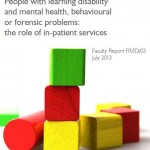
In the wake of the dreadful events at Winterbourne view and the subsequent inquiries and reports, there is now a real push to consider the place of inpatient services for people with learning disabilities who present with complex needs and behavioural challenges.
We have posted recently about alternatives to inpatient services, for example the Association for Supported Living report and tools and approaches that can be used to help plan and deliver person centred services, for example the West Midlands toolkit.
Last week though saw the publication of a considered report by the Royal College of Psychiatrists that attempts to set out more clearly the role of inpatient services for this group.
The report, from the faculty of Faculty of Psychiatry of Intellectual Disability sets out to clarify the nature of in-patient services and the role these services could play in providing safe and effective care.
The authors describe the range of in-patient service provision, as they believe that the narrow focus on ‘assessment and treatment units for challenging behaviour’ which they believe has dominated the recent debate does fully capture the spectrum of in-patient services and their different functions.
They suggest six categories of in-patient beds and describe the relationships between these categories.
- high, medium and low secure forensic beds
- acute admission beds within specialised learning disability units
- acute admission beds within generic mental health settings
- forensic rehabilitation beds
- complex continuing care and rehabilitation beds
- other beds including those for specialist neuropsychiatric conditions.
They set out that at all times, the in-patient services should form part of a care pathway which complements the work of community teams to achieve good outcomes for people.
They describe the use and function of these different categories of service and the relationship between them.
Drawing on data from the faculty’s representatives in England, they suggest that there are currently approximately 3,954 beds in NHS and independent sector settings in the 10 strategic health authority regions of England, 2393 category 1, 814 category 2, 622 categories 4/5 and 125 category 6 beds (They had no specific data available for category 3 beds).
They point out that this is almost a 90% reduction from the 33 000 NHS beds available in 1987–1988 and comment that this reduction may pose a risk as reductions in availability of beds in categories 5 and 6 may mean that more people are admitted to category 1 forensic beds
The authors make a number of recommendations for action which focus on awareness of the different categories of beds and their functions; availability of acute in-patient treatments, regional commissioning strategy development; care pathway development; leadership be community services and planning for discharge; availability of multidisciplinary therapeutic input ; external accreditation processes to be used for in-patent units; the requirement to produce a minimum data-set of treatment outcomes and the need to explore in more detail the potential to legally enforce continuous supervision in the community for people who currently stay for very long periods in hospital for the protection of the public.
Dr Ian Hall, Chair of the Royal College of Psychiatrists’ Faculty of Psychiatry of Intellectual Disability at the Royal College of Psychiatrists, said:
“The Royal College of Psychiatrists wholeheartedly support the development of better community services, particularly for those with challenging behaviour and other major mental health needs. However, for those people who do require inpatient treatment because of the severity of their mental health, behavioural or forensic problems, it is crucial that they have services of the highest quality with clear treatment goals and outcomes. Care pathways and support must be in place so that people can move safely to community settings promptly as soon as their risk profile allows.”
read the full report here: People with learning disability and mental health, behavioural or forensic problems: the role of in-patient services,
Royal College of Psychiatrists’ Faculty of Psychiatry of Intellectual Disability Faculty Report FR/ID/03
